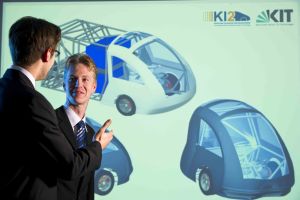Sep
12
Research Factory – a New Kind of School for Building Batteries
September 12, 2011 | Leave a Comment
Scientists at the Karlsruhe Institute of Technology (KIT) plan to cut the cost to manufacture batteries and power trains of electric vehicles in half by 2018 through closing the gaps in the innovation chain. To get there KIT scientists are developing concrete, close-to-industry solutions for energy the storage and power trains and combine them on the system level. The plan is to build a close-to-industry “research factory” on the premises of KIT. KIT will introduce its concept of the €200 million project this coming week at the IAA International Motor Show.
Similar to other publicly funded big research facilities, such as accelerators and clean-room laboratories, the “research factory” will be opened to all partners from industry and research and, thus, contribute to a rapid and wide dissemination of new technologies in Germany.
Project head Andreas Gutsch explains the school’s positioning, “It (battery and power train technology) is no longer focused on studying individual molecules or components, but on developing solutions on the system level, which meet industrial requirements.”
The schools is building up a position called “Competence E” an umbrella project at Karlsruhe Institute of Technology, where 250 scientists from 25 institutes cooperate in an interdisciplinary manner in order to commercialize innovations from research.
“It is a central objective of Competence E to rapidly commercialize innovations from Karlsruhe.” said Gutsch. Apart from teaching and research, innovation is one of the three pillars of KIT. “We are actively approaching industry and will even intensify these efforts. We are conducting excellent research for application, not for the drawer.”
Under the Competence E project at KIT, about 150 new positions are to be filled by engineers. The first 50 engineers have be employed in 2012. In an extra-occupational qualification program at KIT, they will be trained to become specialists in the field of electromobility. Applications for the positions will be offered in Germany and Spain.
KIT’s already has a long list of developments: Nanomaterials based on iron-carbon now have twice the specific capacity compared to conventional batteries. A new process reduces the filling time of batteries with electrolytes to one tenth. The corresponding patent has been applied for. Modular battery and power train concepts will allow for a massive cost reduction in mass production.
“To make use of the large innovation potential resulting from the high number of partial improvements, we will consistently pursue further development on the system level,“ explains Gutsch. That’s the purpose of the newly minted “research factory” being planned at KIT. That way the gap in the chain of innovation and added value between research and industry will be closed by the construction of demonstrators and prototype fabrication lines for novel batteries and electric motors based on KIT’s know-how.
A “research factory” is certainly a grand idea and may prove to be highly practical and beneficial to the businesses up close and able to participate. Just how the intellectual property osmosis and rights will be managed promises to be quite a challenge – but the school is in Germany – not in the heavily lawyered up U.S. It could work really well.
If the “research factory” does light off some commerce one could fairly expect the idea to spread. Depending on the location and the views of the culture to developing technology the idea may have quite a long reach.
It will be a good thing to coalesce information and redistribute it as education and training. The challenge might turn out to be just keeping up. Good luck to the folks at KIT. Keep those press releases coming.


